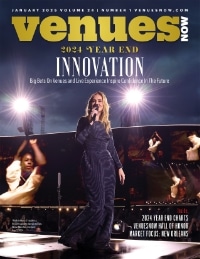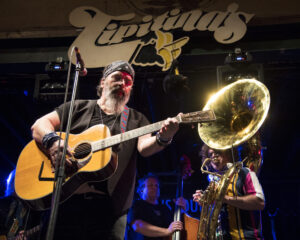Ray Winkler
CEO & Design Director | Stufish

The Stufish team behind the magic, with CEO and design director Ray Winkler standing in the front, second from right.
Ray Winkler refuses to take sole credit – either for appearing on this executive list or for the work behind the innovative “Adele In Munich” residency.
“I’m not accepting this as an individual award. I’m only accepting this on behalf of the rest of the team,” he said. “I would not be where I am without people that are here in the studio working cleverly, creatively, intelligently, and very hard towards the collective success that we call Stufish.”
The London-based company founded by Mark Fisher in 1994 has designed the stages of many of the world’s biggest tours by the world’s biggest acts over the years. The team prides itself on running a studio “on excellence, big ambitions, and always willing to go that extra mile to deliver beyond expectations,” as Winkler puts it. In turn, they get to enjoy “the privilege of working with some of the most amazing talent, and their brilliant teams.” In 2024, Adele, Sabrina Carpenter, and Lana Del Rey are just the tip of the iceberg.
Adele’s Munich residency in particular set new standards for what a live show can look and sound like. It also reminded Winkler of how far the business has come.
“I started off working on U2’s Popmart tour (in 1997), which featured an LED screen that was 700 square meters of surface area with a pixel pitch of 150 millimeters,” he said. “More than 25 years later, Adele’s screen was 5,000 square meters, and a pixel pitch of 5 millimeters, and it’s 220 meters wide by 20 meters tall. You can see how the trajectory is of a rising trend.”
However, technical specs aren’t everything.
“We never confuse technical advancements as a guarantee for a better experience,” he said. “The better experience comes when one understands what the potential of these advances are, whether it’s video screens, processing power, or new ways of motion capturing artists. … Eventually something will gel into what one would call a ‘Gesamtkunstwerk’ in German, like the Adele show was.”
Winkler fell in love with live music a long time ago, too far back to remember, he says, “I grew up on Java, Indonesia, in the analog world. No radio, very little TV.”
One of his earliest memories of being mesmerized by a live show was seeing a traditional Ramayana shadow puppet performance as a young boy.
“It was magical,” he recalled, “because it was a portal into another world. That’s what live events are, whether it’s the Lion King, Adele, or ABBA as avatars on stage – they are a window into another world.”
Opening that window is where Stufish excels.
“Although it’s fleeting and ephemeral, there is a lifelong memory attached to it,” he said.
“That’s why live events are so important, they nourish the soul, the heart, and the mind, which is just as important as making sure that you get all of your physical nutrition to keep your body fit. Without a healthy mind, heart, and soul, I would argue that the body is not really up for it.”
Even as a young boy Winkler realized that he didn’t want to be on stage basking in the limelight, but contribute to the collective experience in the way that came most naturally to him.
“I’m very fortunate to have grown up in an incredibly creative household,” he said, noting his father being an architect and sculptor, musician, painter and poet. “All of these things, to me, never felt like something alien that you needed to acquire. It just felt like it was something inside of me that I needed to ignite. And for that ignition, I’m in debt to a number of people. One, to my father, but also, very importantly, to Mark Fisher, who was the founder of Stufish, who taught me a lot, and gave me the sense that what we were doing was meaningful, that making people happy is actually pretty important.”
Growing up on Java, Winkler found out at age 5 that the last Javanese Tiger had been shot dead. It left a lasting impression on him.
“The mindset we have, where everything is there for our abundant use, or misuse, has percolated through every activity we do,” he said. “I do think that each one of us has a collective responsibility in the environment we operate in. My environment is entertainment. So, we’re looking at new ways of doing shows. Incrementally, within the industry, I hope we do embrace the sense of responsibility so that the next generation after us, and the generation after that, can afford the tools and the means to generate joyous and momentous events. Because without that, it becomes pretty bleak in my mind.”







